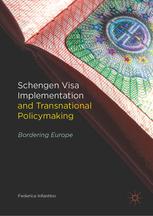-
Partager cette page
Schengen Visa Implementation and Transnational Policymaking Bordering Europe
This book examines the timely topic of controlling the borders of the European Schengen Area. It considers the state perspective on border regulation, subjecting day-to-day practices of EU visa policy implementation to close analytical scrutiny. The objects of the analysis are three European Member States—France, Belgium, and Italy—that implement EU visa policy in Morocco, a country whose nationals are considered to be a migratory ‘risk’ for the EU. The book focuses on the implementation of EU visa policy in the consulates of Belgium, France and Italy in Casablanca.

This book examines the timely topic of controlling the borders of the European Schengen Area. It considers the state perspective on border regulation, subjecting day-to-day practices of EU visa policy implementation to close analytical scrutiny. The objects of the analysis are three European Member States—France, Belgium, and Italy—that implement EU visa policy in Morocco, a country whose nationals are considered to be a migratory ‘risk’ for the EU. The book focuses on the implementation of EU visa policy in the consulates of Belgium, France and Italy in Casablanca. The empirical research and the comparative perspective make this book distinct. The book uses a ‘comprehensive implementation approach’ by taking account of the local, national and supranational locations of policy-making. It builds on in-depth pioneering fieldwork and a comparative research design that includes those three locations. The research design has determined the evolving of the puzzle and the realizing of the unanticipated: cross-national differences diminish when policy is put into practice. Extensive research into the visa sections of those EU Member States provides highly original material that sheds light on the obscure black box of EU visa policy implementation, therefore contributing to policy studies, migration studies, and studies on the European Union.
